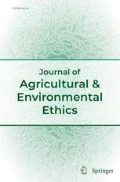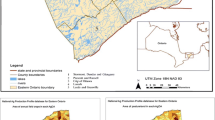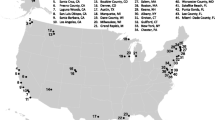Abstract
There is a growing need to implement anticipatory climate change adaptation measures, particularly in vulnerable sectors, such as in agriculture. However, setting goals to adapt is wrought with several challenges. This paper discusses two sets of challenges to goals of anticipatory adaptation, of (1) empirical and (2) normative character. The first set of challenges concern issues such as the extent to which the climate will change, the local impacts of such changes, and available adaptive responses. In the second set of uncertainties are issues such as the distribution of burdens to enhance adaptive capacities in vulnerable agents with a legitimate claim to such resources, and what anticipatory adaptation ideally should result in. While previous discussions have been limited to either discuss the first or second set of uncertainties, this paper suggests that both dimensions should be considered when setting goals in social planning with long time frames. A taxonomy will be suggested that combines both dimensions. Furthermore, strategies for managing situations in which there are either empirical, or normative, uncertainties will be proposed which could be used in social decision-making with long planning time-frames in which goals must be set.
Similar content being viewed by others
Notes
The distinction between empirical and normative issues might not always be as sharp as discussed in this paper. For instance, values play a great role when determining something to be a risk or threat. An anthropocentric might view negative impacts on local industries as a threat, whereas an ecocentric might not give the same priority to local economic growth. Such differences in values will affect how the estimated impacts of climatic changes are interpreted, and what interventions that are deemed required. This is also evidenced by the IPCC, suggesting that “[d]etermining what is dangerous [climate change] is not a matter for natural science alone; it also involves value judgment” (IPCC 2014d: 211). That is, the same empirical information regarding assessed impacts of climate change may have different policy implications, depending on underlying values and what to regard as harm.
The only representative concentration pathway not likely to exceed 2 °C increase by 2100—RCP2.6—is still likely to entail increases in surface temperatures between 0.3 and 1.7 °C compared to the period 1986–2005 (IPCC 2014c: 10). This pathway will require extensive mitigation action, but even if successful, it will entail temperature increases and increased adaptation needs in several regions.
Another way of handling disagreements is through coercion or use of brute force. However, it is very questionable whether that would be considered legitimate even if ensuring safety and order (cf. Sleat 2014: 7).
The lack of action might, in part, explain why ‘loss and damage’ has recently been given greater attention by the parties of the UNFCCC. The Conference of the Parties 19 in Warsaw, 2013, sought to establish mechanisms to address loss and damage caused by extreme weather events and slow onset events such as rising sea levels, in which vulnerable agents are compensated for losses and damages.
Some entertain the hope of finding agreement between different normative perspectives. Most notable is perhaps the ‘convergence hypothesis’ as formulated by Bryan Norton, stating that even weak anthropocentric and ecocentric viewpoints can converge on and support the same policy (Norton 1991). The hypothesis has been criticized from several perspectives (cf. Minteer 2009 for an overview).
Similar ‘absolute’ goals have also been used in practical policies. As an example, the Swedish traffic safety goal ‘Vision Zero’ had the long-term aim that ‘no one would be killed or seriously injured in the road transportation system’, that is, of reducing mortalities and serious injuries in the road transportation system to zero (Nihlén Fahlquist 2006: 1113).
References
Baard, P. (2014). Risk-reducing goals: Ideals and abilities when managing complex environmental risks. Journal of Risk Research,. doi:10.1080/13669877.2014.961513.
Baard, P., & Edvardsson Björnberg, K. (2015). Cautious utopias: Environmental goal-setting with long time frames. Ethics, Policy & Environment. (in press).
Baard, P., Vredin Johansson, M., Carlsen, H., & Edvardsson Björnberg, K. (2012). Scenarios and sustainability: Tools for alleviating the gap between municipal means and responsibilities in climate change adaptation planning. Local Environment, 17, 641–662. doi:10.1080/13549839.2011.646969.
Canales Trujillo, N. & Nakhooda, S. (2013). The effectiveness of climate finance: A Review of the Adaptation Fund. ODI Working Paper 373.
Caney, S. (2005). Cosmopolitan justice, responsibility, and global climate change. Leiden Journal of International Law, 18, 747–775.
Caney, S. (2014). Two kinds of climate justice. Journal of Political Philosophy, 22, 125–149.
Connelly, S. (2007). Mapping sustainable development as a contested concept. Local Environment, 12, 259–278.
Duus-Otterström, G., & Jagers, S. C. (2012). Identifying burdens of coping with climate change: A typology of the duties of justice. Global Environmental Change, 22, 746–753.
Edvardsson, K., & Hansson, S. O. (2005). When is a goal rational? Social Choice and Welfare, 24, 343–361.
Estlund, D. M. (2008). Democratic authority—a philosophical framework. Princeton: Princeton University Press.
Fankhauser, S., Smith, J. B., & Tol, R. S. J. (1999). Weathering climate change: Some simple rules to guide adaptation decisions. Ecological Economics, 30, 67–78.
Gardiner, S. (2011). A perfect moral storm—the ethical tragedy of climate change. Oxford: Oxford University Press.
Gardiner, S. (2012). Are we the scum of the Earth? In A. Thompson & J. Bendik-Keymer (Eds.), Ethical adaptation to climate change (pp. 242–259). Cambridge: MIT Press.
Gheaus, A. (2013). The feasibility constraint on the concept of justice. The Philosophical Quarterly, 63, 445–464.
Gilabert, P., & Lawford-Smith, H. (2012). Political feasibility: A conceptual exploration. Political Studies, 60, 809–825.
Hansen, J., Kharecha, P., Sato, M., Masson-Delmotte, V., Ackerman, F., Beerling, D. J., et al. (2013). Assessing “dangerous climate change”: Required reduction of carbon emissions to protect young people, future generations and nature. PLoS ONE,. doi:10.1371/journal.pone.0081648.
Hartzell-Nichols, L. (2011). Responsibility for meeting the costs of adaptation. WIREs Climate Change, 2, 687–700.
Intergovernmental Panel on Climate Change (IPCC). (2001). Third assessment report of working group II. Climate change 2001: Impacts, adaptations, and vulnerability. USA: Cambridge University Press.
Intergovernmental Panel on Climate Change (IPCC). (2007). Working group II: Impacts, adaptation, and vulnerability. USA: Cambridge University Press.
Intergovernmental Panel on Climate Change. (IPCC). (2014a) Impacts, adaptation and vulnerability: summary for policy makers. http://ipcc-wg2.gov/AR5/images/uploads/WG2AR5_SPM_FINAL.pdf. Accessed 26 Aug 2014.
Intergovernmental Panel on Climate Change (IPCC). (2014a). Climate change 2014: Impacts, adaptation, and vulnerability. Cambridge: Cambridge University Press.
Intergovernmental Panel on Climate Change (IPCC). (2014c). Climate change 2014: Synthesis report, summary for policy makers. http://www.ipcc.ch/pdf/assessment-report/ar5/syr/AR5_SYR_FINAL_SPM.pdf. Accessed 10 June 2015.
Intergovernmental Panel on Climate Change (IPCC). (2014d). Climate change 2014: Working group III contribution to the fifth assessment report of the intergovernmental panel on climate change. http://www.ipcc.ch/pdf/assessment-report/ar5/wg3/ipcc_wg3_ar5_full.pdf. Accessed 15 June 2015.
Jagers, S. C., & Duus-Otterström, G. (2008). Dual climate change responsibility: On moral divergences between mitigation and adaptation. Environmental Politics, 17, 576–591.
Jensen, M. (2009). The limits of practical possibility. The Journal of Political Philosophy, 17, 168–184.
Klein, R. J. T., Schipper, E. L. F., & Dessai, S. (2005). Integrating mitigation and adaptation into climate and development policy: Three research questions. Environmental Science & Policy, 8, 579–588.
Minteer, B. (Ed.). (2009). Nature in Common? Philadelphia: Temple University Press.
Moellendorf, D. (2014). The moral challenge of dangerous climate change. Cambridge: Cambridge University Press.
Nihlén Fahlquist, J. (2006). Responsibility ascription and vision zero. Accident Analysis and Prevention, 38, 1113–1118.
Norton, B. (1991). Towards unity among environmentalists. New York: Oxford University Press.
Page, E. A. (2006). Climate change, justice and future generations. Cheltenham: Edward Elgar.
Persson, Å., & Remling, E. (2014). Equity and efficiency in adaptation finance: Initial experiences of the adaptation fund. Climate Policy, 14, 488–506. doi:10.1080/14693062.2013.879514.
Pimentel, D., Brown, N., Vecchio, F., La Capra, V., Hausman, S., Lee, O., et al. (1992). Ethical issues concerning potential global climate change on food production. Journal of Agricultural and Environmental Ethics, 5, 113–146.
Posner, E. A. M., & Weisbach, D. (2010). Climate change justice. Princeton: Princeton University Press.
Schmidt, G. (2006). ‘Geoengineering in Vogue.’ Real Climate. http://www.realclimate.org/index.php/archives/2006/06/geo-engineering-in-vogue/. Accessed 8 Jan 2015.
Schneider, S. H., & Lane, J. (2006). Dangers and thresholds in climate change and the implications for justice. In N. Adger, J. Paavola, S. Huq, & M. J. Mace (Eds.), Fairness in adaptation to climate change (pp. 23–52). Massachusetts: MIT Press.
Shue, H. (2014). Climate justice: Vulnerability and protection. Oxford: Oxford University Press.
Sleat, M. (2014). Realism, liberalism and non-ideal theory or, are there two ways to do realistic political theory? Political Studies,. doi:10.1111/1467-9248.12152.
Smit, B., & Skinner, M. W. (2002). Adaptation options in agriculture to climate change: A typology. Mitigation and Adaptation Strategies for Global Change, 7, 85–114.
Stemplowska, Z. (2008). What’s ideal about ideal theory? Social Theory and Practice, 34, 319–340.
UN. (1998). Kyoto protocol to the United Nations Framework Convention on Climate Change. New York, NY: United Nations.
UN. (2014). ‘Information paper on the national adaptation plan process’. http://unfccc.int/adaptation/workstreams/national_adaptation_plans/items/6057.php Accessed 23 December 2014.
Valentini, L. (2012). Ideal and non-ideal theory: A conceptual map. Philosophy Compass, 7(9), 654–664.
Williams, B. (2005). In the beginning was the deed: Realism and moralism in political argument. New Jersey: Princeton University Press.
Acknowledgments
The author would like to thank the two anonymous reviewers for valuable comments. He would also like to thank Olle Torpman, Jessica Nihlén Fahlquist, and Edward Page for commenting on earlier versions of this manuscript.
Author information
Authors and Affiliations
Corresponding author
Rights and permissions
About this article
Cite this article
Baard, P. Adaptive Ideals and Aspirational Goals: The Utopian Ideals and Realist Constraints of Climate Change Adaptation. J Agric Environ Ethics 28, 739–757 (2015). https://doi.org/10.1007/s10806-015-9557-8
Accepted:
Published:
Issue Date:
DOI: https://doi.org/10.1007/s10806-015-9557-8




